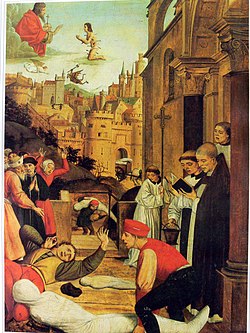Plague
| Poetry of reality Science |
| We must know. We will know. |
| A view from the shoulders of giants. |
Plague (or bubonic plague) is a disease caused by the bacterium Yersinia pestis which is thought to be the cause of three world pandemics in history
- The Plague of Justinian in the 6th century CE, which broke apart the Roman Empire for good — though a recent cross-disciplinary analysis in 2019 disputed that this was particularly deadly or that it had much disruption[1][2]
- The Black Death in the 14th century, which wiped out between a quarter and a half of Europe's population and wreaked havoc all over Asia as well
- The Third Pandemic in the late 19th and early 20th centuries, during which the responsible bacterium was isolated
It is a close relative of Y. enterocolitica, which causes the much less serious disease yersiniosis![]() and usually comes from not washing one's hands after contacting uncleaned or improperly cleaned chitterlings.
and usually comes from not washing one's hands after contacting uncleaned or improperly cleaned chitterlings.
The term "plague" was also used historically to refer to any epidemic of disease. These are caused by germs; a fact that has been known since the late 19th century and the validation of the germ theory of disease, which, like evolution, is not a hypothesis but rather demonstrated fact on the order of the theory that rain is caused by clouds. As for why you probably no longer need to worry about the plague, you can thank antibiotics derived from fungi, such as penicillin. However, perhaps it may become a problem again in the future. You never know.
Religion and plagues[edit]
Some Christian fundamentalists persist in suggesting that when others experience outbreaks of disease, that this is a punishment from God, much like the plagues visited upon Egypt; Jerry Falwell said this of the AIDS epidemic among gays,[3] roughly following Fred Phelps's line.
They do this despite the fact that their congregations are filled primarily with elderly people who suffer an epidemic of diseases of excess such as artheriosclerosis. Hypocrisy is, ironically, one of the vices most detested by Jesus according to Biblical accounts (Matthew 23:1 is one famous example). Even more ironically, Jesus also spoke against people who ascribed natural disasters to God punishing their victims (Luke 13:1-3).
Interestingly the Bible actually gives a relatively accurate account (for the Bible) of the bubonic plague itself in 1 Samuel 5:6-14 where it mentions a plague of tumors and rats which ravage the Philistines after they gained possession of the Ark.
Artificial plagues[edit]
Biological warfare is an unfortunate fact of modern life. According to the Westboro Baptist Church, deaths experienced by US combat soldiers at the hands of the Taliban are God's punishment to America for abandoning "Godly ways". Thus, a hypothetical Taliban biological terrorist attack would be, according to such fundamentalists, a plague from God, and Al-Qaeda would be the vicars of the Lord.
During World War II, Unit 731 of the Japanese army conducted biological warfare using plague and other vectors.[4]
References[edit]
- ↑ An ancient outbreak of bubonic plague may have been exaggerated: Archaeological evidence suggests a sixth century epidemic didn’t radically change European history by Bruce Bower (December 2, 2019 at 3:00 pm) Science News.
- ↑ The Justinianic Plague: An inconsequential pandemic? by Lee Mordechai et al. (2019) Proceedings of the National Academy of Sciences 116 (51) 25546-25554. doi:10.1073/pnas.1903797116.
- ↑ http://www.milforddailynews.com/opinion/x1987843539
- ↑ Unit 731: Japan's Secret Biological Warfare in World War II by Peter Williams & David Wallace (1989). Free Press. ISBN 0029353017.

